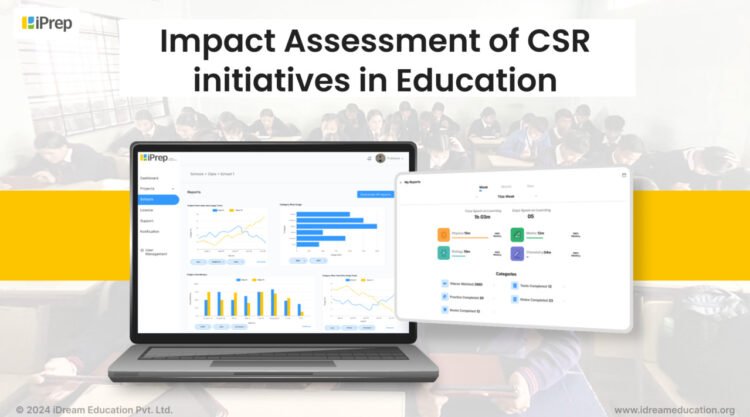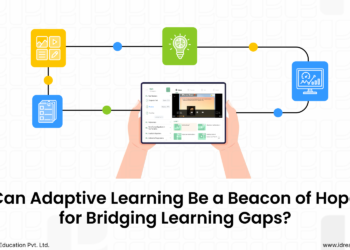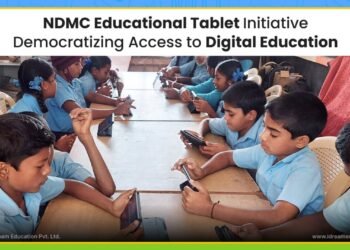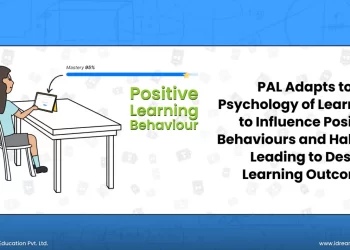Impact assessment of CSR initiatives holds significance, particularly in the realm of education. Evaluating the outcomes and effectiveness of CSR initiatives in education is not merely an record keeping exercise but also helps in understanding improvement in learning outcomes of beneficiaries.
“The importance of impact assessment lies in its ability to gauge the tangible and intangible effects of corporate contributions, ensuring that resources are channeled efficiently to address the pressing needs of the educational sector”, said Pawan Kumar, Assistant Director – Growth and Impact at iDream Education
He further said, a comprehensive impact assessment is a mirror to how a company’s support educational programs that directly influence student performance, enhance access to quality education, and contribute to overall community development value chain.
The Ministry of Corporate Affairs’ recent amendments to corporate social responsibility (CSR) guidelines, has surged through India’s CSR landscape, particularly within the realm of education. The pivotal change mandates the evaluation of CSR initiatives, signaling a move from traditional philanthropy towards a more strategic and impactful approach. The imposition of CSR Impact Assessment has not only ushered in a new era of accountability to the development sector and its stakeholders.
What is the revised spending limit for impact assessment?
In the past, businesses conducting impact assessments on projects exceeding Rs. 1 crore could deduct up to 5% of their total CSR expenditure or Rs. 50 lakh, whichever was less. The revised standard now allows for a deduction of only 2% of total CSR expenditures or Rs. 50 lakh, whichever is less. This shift has resulted in a rise in CSR expenditures focused on generating impact, rather than solely assessing the impact of CSR initiatives.
iDream Education appreciates the recent amendment in corporate social responsibility (CSR) guidelines, recognizing its potential to facilitate Edtech solution providers in creating substantial impact. This modification not only empowers Edtech companies to drive meaningful educational interventions but also aids corporates in creating impact and making well-informed decisions regarding their CSR initiatives in the education sector.
What Next?
Leveraging technology that allows seamless tracking of solutions implemented enables corporations to prioritize impact creation over assessment. EdTech innovations, such as continuous monitoring and reporting dashboards, facilitate tracking and measuring the effectiveness of educational programs anytime, anywhere, emphasizing the transition towards ensuring the effective use of enabled solutions.
Navigate through Cost effective ways of Impact Assessment of CSR initiatives in Education with iDream Education, an Edtech company working with the vision to Facilitate Universal Access to Learning and Growth for All Learners including students in both government and private schools.
Baseline assessment
Baseline Assessment is crucial for achieving desired learning outcomes in education programs by gauging the learning levels of beneficiaries for whom digital learning solutions are being implemented. It serves as a cost effective way for corporates and implementing partners to assess the suitability of chosen solutions or the need for customization to achieve desired results. One of the examples of this is iDream Education’s baseline assessment of over 5000 students in East Jaintia Hills, Meghalaya where they implemented smart classes in 50 schools.
- The challenge at hand involved transporting more than 150 tablets to schools situated in remote areas. However, a very fine and cost-efficient innovation addressed this issue. A specially designed suitcase with compartments tailored to accommodate the tablets was developed. Equipped with wheels at the base, it could be effortlessly moved like a trolley at an airport. Its compact size allowed it to fit smoothly inside a hatchback car, resolving the transportation dilemma. To facilitate charging, we utilized Charging Racks, distributing one unit to each team member’s residence for overnight charging of devices, making it a cost-effective impact assessment tool for iDream Education.
- To facilitate seamless assessment, the process was digitized and simplified using tablets preloaded with offline assessment forms. These forms consisted of subject-specific questions spanning various grade levels, such as interconnected topics up to grade 6 being included in the assessments for 10th-grade students. By analyzing the students’ responses, their precise grade levels were determined.
- The results of the baseline assessment shed light on significant learning gaps among students, revealing that over 90% of them were performing at levels significantly below their current grade. This insight was particularly enlightening for an official from the office of the deputy commissioner, who had collaborated with iDream Education to implement smart classes for digital education in all 50 schools. This case serves as a clear example of the impact assessment of CSR initiatives in education.

Monthly Assessment
A Monthly Assessment serves as a crucial checkpoint in ensuring the desired learning outcomes of an educational program. It is an essential ongoing process conducted to assess the progress of beneficiaries’ learning levels. This evaluation helps in determining the need for additional training on using digital learning solutions, or enabling personalized guidance with implemented solutions. Moreover, it provides corporations with insights into the impact of their CSR initiatives. For instance, iDream Education conducts monthly and midline assessments to ensure the effective utilization and benefits of its implemented solutions.
- One example of this is, retraining at IMpower centre of Aide et Action, Gurugram on making effective use of iPrep on tablets from digital library setup. Teachers at the centre aims to bring regularity in the learning of children to help them achieve their age-appropriate learning level. During retraining sessions, students were encouraged to explore various content, leading to a notable interest in reading storybooks and engaging with interactive lessons.
- Another example of monthly assessment is from our implementation in Meghalaya, where iDream Education’s ground team conducts monthly assessments in schools, similar to baseline assessments. Following the baseline assessment, customized bridge courses were provided to teachers. The course consists of interconnected videos covering the 8th, 9th, and 10th grades and extending to the 6th grade. In addition to the video recommendations, the bridge course has a specific practice section focusing on Maths, Science, and Social Science. This combination of video content and targeted practice exercises are given to ensure a well-rounded learning experience for students.
- The subsequent monthly assessments are showing improvements in student learning levels, with some transitioning from beginner to intermediate proficiency. Such regular monitoring is done to keep stakeholders informed about the progress and impact of their CSR initiatives in education.
Also Read: iDream Education: Your Trusted K-12 Content Provider in India
Endline Assessment
Endline assessment represents a comprehensive evaluation of the impact achieved over a full academic year. It encompasses not just the improvement in student performance but also the acceptance, adoption and usage of implemented solutions. This stage holds significant importance in education programs as it allows for the impact assessment of the overall impact of CSR initiatives. iDream Education undertakes endline assessments using tailored questionnaires for teachers, students, and parents.
- One of the examples of endline assessment is the D-LEAD project, a CSR initiative by the Cipla Foundation. An endline assessment was conducted for Class 10 students in identified schools across three different locations: Patalganga and Kurkumbh in Maharashtra, and Indore in Madhya Pradesh.
- The assessment findings revealed that students found concepts easier to comprehend when learning through video lessons on tablets. Additionally, they appreciated the availability of diverse content on a single platform, which facilitated engaging and effective learning experiences. Furthermore, parents highlighted that the presence of digital content on tablets ignited interest in their child’s learning, resulting in overall improvement in their personalities. These findings highlighted the positive impact of digital learning on students, guiding the foundation in making informed decisions. Consequently, the initiative extended to integration of more tablets and smart classes in schools to enhance educational outcomes further.
Maintenance of Usage Metrics
Usage metrics represent a distinctive monitoring tool enabling corporates to monitor the daily usage of solutions integrated in schools under CSR initiatives. This feature keeps stakeholders updated on the ongoing usage patterns, highlighting which content gains the most interest among students and teachers, as well as how different classes/teachers/students utilize the solution for various purposes. Such insights facilitate the personalization of initiatives and the generation of meaningful impact.
- iDream Education team monitors usage via the reporting dashboard, compiling monthly reports to be shared with pertinent stakeholders. This is a budget friendly impact assessment practice to ensure partners are informed and enables recommendations for potential enhancements or assessments as necessary.
Everyday sharing of reports
Daily sharing of reports is a key practice for assessing impact, aimed at keeping stakeholders informed about the progress and decisions regarding their initiatives. These reports serve to track daily performance and engagement, providing stakeholders with continuous updates on implementation. For instance, in the e-adhigam initiative, iDream Education, a PAL vendor, monitors student usage and learning outcomes data through a centralized reporting dashboard.
- The usage data is shared daily with officials in the Haryana school education department for impact assessment and tracking purposes. This approach enables stakeholders to regularly compare and evaluate individual student usage and progress using the solution.
“If you can not measure it, you can not solve it” said – Abhinav Bhatnagar, Product Lead at iDream Education

This underscores the fundamental principle of impact assessment in CSR initiatives. Through rigorous evaluation methods, organizations can gain insights into the effectiveness of their efforts, identify areas for improvement, and maximize their positive contributions to society and the environment. By embracing a data-driven approach to CSR, corporates can foster genuine, sustainable change in the lives of students. Ultimately, measuring impact isn’t just about accountability; it’s about ensuring that every action taken leaves a meaningful footprint on the path toward a better world.
Also Read: How iPrep by iDream Education is Breaking Barriers to Learning in Government and Rural Schools
The Centralized Reporting Dashboard of iPrep, developed by iDream Education, is tailored to enable Foundations, NGOs, government officials, hardware partners, and other ecosystem stakeholders to assess impact of their CSR efforts in education in cost effective way. Usage reports are stored locally on device and automatically synchronized with a cloud-based reporting dashboard using internet availability for a few minutes, facilitating data-driven insights into learning outcomes.
iDream Education is committed to leveraging digital learning in CSR educational initiatives to deliver tangible and significant impact.In case you would like to know more about Continuous Monitoring and Reporting Dashboard of iPrep by iDream Education, visit their website, www.idreameducation.org, or write to them at share@idreameducation.org





















